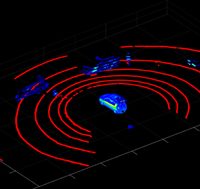
MMT and HDMaps – Mobile Mapping Technologies and HDMaps
Autonomous driving vehicles, or self-driving cars, have made enormous progress in recent years. With advances in computing and sensor technologies, onboard systems can deal with a large amount of data and achieve real-time process continuously and accurately. These systems also handle several specialized functional schemes such as positioning, mapping, perception, motion planning and control. These key components are essential for the vehicle to achieve fully autonomous operation. In addition, HD maps provide detailed map information for navigating autonomous vehicles to ensure the navigation safety to protect human lives. The map itself serves as an additional “pseudo sensor” of the car and it significantly enhances the performance and accuracy of perception and positioning algorithms, which are necessary for the vehicle to drive autonomously. In addition, HD maps and real time accurate positioning enable a number of services and applications, supporting the realization of smart cities.
This workshop will cover relevant topics and trends in mobile mapping and high definition maps for intelligent transportation and smart city applications, and also introduce the new tendencies of this new paradigm in geospatial science.
CHAIRS
(WG I/2)
National Cheng Kung University, Taiwan (WG I/2)
Themes of event:
-
Static HD maps automated production and update
-
Dynamic HD maps automated production and update
-
Conventional and crowd sourcing mapping platforms for HD maps production
-
3rd party certified low-cost multi-sensor mapping systems for ITS applications
-
Autonomous vehicle navigation with HD point cloud maps
-
Autonomous vehicle navigation with HD vector maps
-
HD maps applications
-
Formats, standards and field practice guidelines
-
Georeferenced 3D spatial information processing for smart road applications
-
Georeferenced 3D spatial information manipulation for connected vehicles
-
Multi-sensor calibration
-
Sensor cluster design and platform developments
-
Multi-sensor fusion for seamless mapping and navigation applications
-
Simultaneous localization and mapping with LiDAR or cameras
-
Point cloud processing
-
Deep learning for 3D spatial information processing
-
Feature extraction from georeferenced images and point cloud
-
Multi-sensor system assessment and quality validation
-
GNSS denied and challenging environments validation
-
Novel application cases
Scientific Committee:
Kai-Wei Chiang, National Cheng Kung University, Taiwan
-
Andrea Masiero, University of Florence, Italy
-
Aboelmagd Noureldin, Queens University, Canada
-
Cheng Wang, Xiamen University, China
-
Antonio Vettore, University of Padova, Italy
-
Ling Pei, Shanghai Jiao Tong University, China
-
Allison Kealy, RMIT, Australia
-
Mohamed Elhabiby, Micro Engineering Tech Inc. (METI), Canada
-
Gunther Retscher, University of Vienna, Austria
-
Jonathan Li, University of Waterloo, Canada
-
Xiaoji Niu, Wuhan University, China
-
Vassilis Gikas, NTUA, Greece
-
Marco Piras, Polytechnic of Turin, Italy
-
Paolo Dabove, Polytechnic of Turin, Italy
-
You Li, Wuhan University, China
-
Chenglu Wen, Xiamen University, China
-
Adel Mohamed Aly Elsayed Moussa, Calgary University, Canada
-
Hsiu-Wen Chang Joly, PSL University, France
-
Salil Goel, Uttar Pradesh, India



